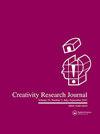On the Generalizability of the Bodily State Effect on Creativity
IF 2.5
3区 心理学
Q2 PSYCHOLOGY, EDUCATIONAL
引用次数: 0
Abstract
Previous studies found that bodily states have an impact on divergent thinking, but it remains to be seen how generalizable this effect could be, how exactly it depends on cognitive control, and whether similar effects can be found on convergent thinking. To address these questions, we examined the bodily state effect on divergent thinking, convergent thinking, and cognitive control in two experiments. In Experiment 1, participants performed the Alternate Uses Task, the Remote Associates Task, and an auditory Stroop task under one of the three bodily states: sitting, standing, or roaming. In Experiment 2, participants completed the three tasks while standing and while roaming. Results showed that bodily state had no significant effect on divergent thinking and the Stroop effect, while roaming shorten the reaction times (Experiment 1) and increased accuracy (Experiment 2) comparing with sitting or standing in the convergent thinking task. Bayesian analysis provided strong or moderately strong evidence for the null hypothesis for these effects. Taken together, the present experiments showed no stable bodily state effect on divergent thinking or convergent thinking and Stroop effect. Possible explanations for the discrepancy between the current results and those reported in previous studies were discussed. ARTICLE HISTORY Received August 24, 2022论身体状态对创造力影响的普遍性
先前的研究发现,身体状态对发散性思维有影响,但这种影响有多普遍,它在多大程度上取决于认知控制,以及是否能在收敛性思维中发现类似的影响,仍有待观察。为了解决这些问题,我们在两个实验中研究了身体状态对发散思维、收敛思维和认知控制的影响。在实验1中,参与者在坐着、站着或漫游三种身体状态中的一种下完成了交替使用任务、远程关联任务和听觉Stroop任务。在实验2中,参与者在站立和走动时完成三项任务。结果表明,身体状态对发散性思维和Stroop效应没有显著影响,而在趋同性思维任务中,与坐着或站着相比,漫游缩短了反应时间(实验1),提高了反应准确性(实验2)。贝叶斯分析为这些效应的零假设提供了强有力或中等强有力的证据。综上所述,本实验未发现稳定的身体状态对发散性思维或收敛性思维以及Stroop效应的影响。讨论了当前结果与先前研究报告之间差异的可能解释。文章历史收到2022年8月24日
本文章由计算机程序翻译,如有差异,请以英文原文为准。
求助全文
约1分钟内获得全文
求助全文
来源期刊

Creativity Research Journal
Multiple-
CiteScore
5.10
自引率
7.70%
发文量
52
期刊介绍:
Creativity Research Journal publishes high-quality, scholarly research capturing the full range of approaches to the study of creativity--behavioral, clinical, cognitive, crosscultural, developmental, educational, genetic, organizational, psychoanalytic, psychometrics, and social. Interdisciplinary research is also published, as is research within specific domains (e.g., art, science) and research on critical issues (e.g., aesthetics, genius, imagery, imagination, incubation, insight, intuition, metaphor, play, problem finding and solving). Integrative literature reviews and theoretical pieces that appreciate empirical work are extremely welcome, but purely speculative articles are not published. Readers are encouraged to send commentaries, comments, and evaluative book reviews.
 求助内容:
求助内容: 应助结果提醒方式:
应助结果提醒方式:


